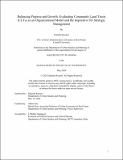Balancing Purpose and Growth: Evaluating Community Land Trusts (CLTs) as an Organizational Model and the Imperative for Strategic Management
Author(s)
Rosario, Eduardo
DownloadThesis PDF (13.54Mb)
Advisor
Saiz, Albert
Terms of use
Metadata
Show full item recordAbstract
The U.S. is experiencing a severe housing affordability crisis affecting both homeownership and rental markets across income levels. Community land trusts (CLTs) have gained popularity as a promising model to help preserve long-term affordable housing. However, while CLTs have been extensively studied conceptually, relatively little research has examined the strategic management choices and internal practices which ultimately impact the CLT's ability to scale its impact within communities.
This thesis explores pivotal strategic considerations faced by CLT leaders as their organizations evolve. Through a review of the origins and philosophies underlying the CLT model, examples of CLTs across the U.S., and in-depth case studies, the research identifies three key areas where management choices are critical: 1) Clearly defining the CLT's vision, mission, and goals to maintain focus; 2) Navigating tradeoffs in organizational setup, housing types, scale, and speed of development; and 3) Aligning leadership capabilities with the CLT's growth stage.
The findings highlight that while CLTs share the singular purpose of providing permanently affordable housing, their management priorities and pathways to impact can diverge significantly based on contextual factors and strategic decisions. This analysis provides a framework for CLT leaders to intentionally guide the trajectory of their organizations based on their specific missions, needs, market conditions, and aspirations for scale. The research aims to inform both emerging and established CLTs to maximize their impact on the housing affordability crisis.
Date issued
2024-05Department
Massachusetts Institute of Technology. Department of Urban Studies and PlanningPublisher
Massachusetts Institute of Technology